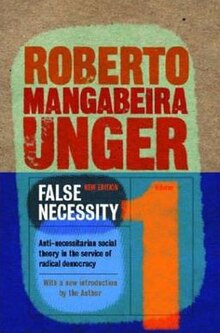Politics: A Work In Constructive Social Theory

Cover of False Necessity
|
|
| Author | Roberto Mangabeira Unger |
|---|---|
| Genre | Political Theory |
| Published | 1987 |
| Pages | 661 (Vol. 1) 256 (Vol. 2) 231 (Vol. 3) |
| ISBN | (Vol. 1) 978-1-84467-515-7 (Vol. 2) 978-1-84467-516-5 (Vol. 3) |
| Preceded by | The Critical Legal Studies Movement |
| Followed by | What Should Legal Analysis Become? |
Politics: A Work in Constructive Social Theory is a 1987 book by philosopher and politician Roberto Mangabeira Unger. In the book, Unger sets out a theory of society as artifact, attempting to complete what he describes as an unfinished revolution, begun by classic social theories such as Marxism, against the naturalistic premise in the understanding of human life and society. Politics was published in three volumes: False Necessity: Anti-Necessitarian Social Theory in the Service of Radical Democracy, the longest volume, is an explanatory and programmatic argument of how society might be transformed to be more in keeping with the context-smashing potential of the human imagination; Social Theory: Its Situation and Its Task, is a "critical introduction" that delves into issues of social science underpinning Unger's project; and Plasticity Into Power: Comparative-Historical Studies on the Institutional Conditions of Economic and Military Success, is a collection of three historical essays illuminating the theoretical points Unger advanced in the first two volumes. In 1997, an abridged, one-volume edition of Politics was issued as Politics, The Central Texts, edited by Zhiyuan Cui.
In False Necessity, Unger presents both an explanatory theory of society and a program for the reform of society as a radical democracy that respects the ability of human beings continually to outreach, subvert, and remake their contexts. Unger proposes an "empowered democracy" that is structured so that it is maximally open to revision, a form of organization Unger calls "structure-revising structure." As Unger explains, "[a]s an explanatory theory of society, False Necessity seeks to free social explanation from dependence upon the denial of our freedom to resist and to remake our forms of social life. It carries to extremes the thesis that everything in society is politics, mere politics...." Unger argues that "the best hope for the advancement of the radical cause—the cause that leftists share with liberals—lies in a series of revolutionary reforms in the organization of governments and economies and in the character of our personal relations."
The explanatory theory in False Necessity focuses on cycles of reform and retrenchment in the West after World War II—particularly the repetitive nature of ordinary social conflict—in which there seem to be few options for major social change. Radical reform movements seem inevitably to fail even when they manage to achieve control of the government, due to a combination of business disinvestment and the bickering and jockeying for advantage among different groups of workers. Unger advances a hypothesis and analysis of a formative contexts that explains these stubborn cycles of reform and retrenchment. Formative contexts include the institutional arrangements and imaginative presuppositions that shape people’s routines, and give certain groups mastery over the wealth, power, and knowledge in society. Unger lays a groundwork for the programmatic argument by analyzing certain possibilities in the state and in the microstructure of society—the extension of rights to guarantee the inviolability of the individual against government oppression and to meet basic material needs; the patron-client relationship as an example of a replacement of the impersonal by the personal; and a flexible variant of rationalized collective labor as a mode of work organization that breaks down the barrier between task-definers and task-executors in the workplace. Unger employs the concept of negative capability to describe the quality of freedom that emerges from liberating ourselves from rigid roles and hierarchies that compose part of society's formative contexts, and notes that one limitation on remaking contexts is the difficulty of combining institutions embodying different levels of negative cability into a single context. Unger concludes the explanatory section by setting forth an institutional genealogy of contemporary formative contexts and a theory of context making, both of which offer insight that can be used in remaking society.
...
Wikipedia
